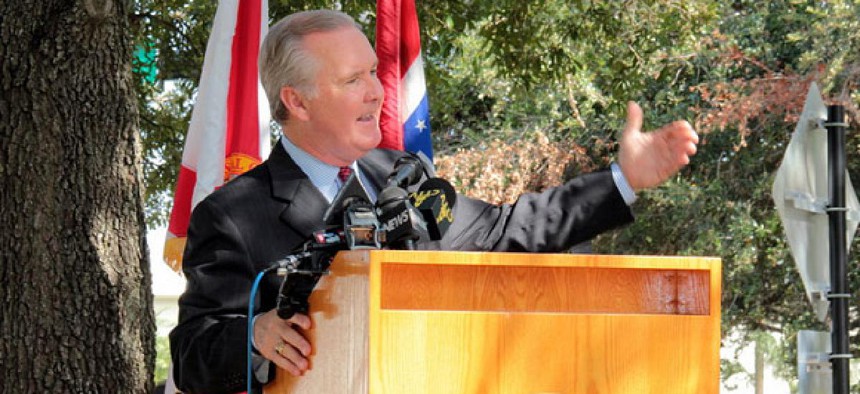
Tampa Mayor Bob Buckhorn City of Tampa
Tampa mayor: Storm threat greatly diminished
Hurricane Center official cautions city is 'not off the hook yet.'
TAMPA, Fla. -- Tampa Mayor Bob Buckhorn said on Thursday that state, local, and Republican National Convention officials are “significantly” less concerned that Tropical Storm Isaac will be a severe disruption to next week’s gathering after the latest projections show the storm continuing on a track that would take it west of the city.
“I don’t think there’s any reason for concern as it relates to cancellation,” Buckhorn told National Journal. “We’re not prepping for an evacuation. We are doing what we do a dozen times a year during hurricane season.”
He added later, “The hysteria has pretty much passed now, and folks are on to other stories.”
Buckhorn spoke with National Journal shortly after taking part in a 5:15 p.m. conference call with RNC and state officials, the second of a twice-daily phone call among the different organizations to coordinate their response to approaching storm.
The possibility that Isaac, which is expected to turn into a Category 1 hurricane by the time it reaches Tampa, could force a change or even outright cancellation of the convention has weighed heavily on the event’s organizers and the approximately 50,000 people expected to attend. RNC officials have maintained throughout that they fully expect the convention -- during which Mitt Romney will officially be nominated as the GOP’s presidential nominee -- to proceed as planned.
“The convention is working closely with our partners at the federal, state, and local levels to monitor the weather, and we have contingency plans in place to ensure the health and safety of convention delegates, guests and visitors, and the Tampa Bay community,” convention spokesman James Davis said. “We are looking forward to a great convention.”
Tampa is still expected to be hit by wind and rain on Monday, and meteorologists caution the city remains at risk.
“They’re not off the hook yet,” said Dennis Feltgen, a spokesman for the National Hurricane Center in Miami. “We haven’t changed anything down here. They still need to watch this closely.”
Buckhorn earlier in the week sparked concern when he suggested that the storm could force the convention to be canceled. But his tone had changed dramatically by Thursday afternoon.
“If you’re not a Floridian, you don’t necessarily appreciate that this is part of our lives,” he said. “The national media gets worked into a frenzy over a storm like this. We deal with it on a regular basis.”
As of 5 p.m. on Thursday, Isaac was still a weak, disorganized system in the Caribbean Sea, approximately 255 miles southeast of Santo Domingo, Dominican Republic. The storm has turned to the west-northwest, the National Hurricane Center reported, moving at 16 mph. Continuing on that track, Isaac is expected to pass over or near the island of Hispanola on Friday, and Cuba on Saturday.
The exact track of Isaac will determine its strength as it treks across the Caribbean. If the center of circulation passes over land—particularly the mountainous areas of Hispanola and Cubs—that would weaken the system prior to entering the warm Florida Straits, where rapid intensification is possible.
The storm is currently forecast to be near Key West, Fla., by Monday morning, as a hurricane with maximum sustained winds around 75 mph. But long-term forecasts for tropical systems are not very reliable, and the Hurricane Center warns that the storm could be anywhere from just off the east coast of Florida to the central Gulf of Mexico.
Most of the computer models on which forecasters rely take Isaac over or near the west coast of Florida—including Tampa—Monday into Tuesday. Along a track such as that, the city can expect heavy rain, strong winds, and the possibility of coastal flooding of low-lying areas. But whether those conditions materialize—and to what degree—depends largely on the storm's ultimate track.
If the storm remains offshore in the Gulf, most computer models indicate it could threaten the northern Gulf Coast from the Florida panhandle west to Louisiana by midweek. That could remind some convention-goers and observers of 2008, when Republicans were forced to cancel the first night of their convention in St. Paul, Minn., as Hurricane Gustav made landfall along the Louisiana Gulf Coast.
Tampa is prone to hurricanes, although not as much as other parts of Florida. Over a 100-year period, the city is struck on average once every nine years, according to the Hurricane Center’s Feltgen. Miami is hit once every five or six years, he said. Of course, the city might also be due: The last hurricane to hit the city was in 2004, when Hurricane Jeanne came ashore.
Tampa was last hit by a major hurricane when a Category 3 storm wreaked havoc in 1921.
The twice-daily phone calls among officials were organized in part to avoid conflicting messages of the hurricane’s hazard to the city and convention attendees. Although Florida officials, including Gov. Rick Scott, a Republican, have said that organizers would ultimately decide if the convention goes on, Scott does have the authority to order an evacuation of the area, according to spokeswoman Julie Roberts.
“The goal of what we’re doing is to have these conversations so the governor doesn’t have to make that stand,” Roberts said. “All stakeholders are looking at it to make the best decision for the RNC.”
Roberts emphasized that a mandatory evacuation is a remote possibility in the case of a direct hit from a severe storm—but such an evacuation appears unlikely at this point. “We’re not talking about a mandatory issue,” she said.






